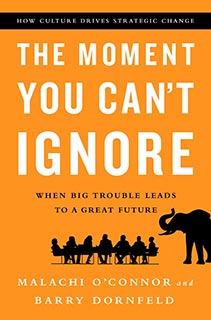The Moment You Can't Ignore
November 17, 2014
"The Moment You Can't Ignore demonstrates that the adage, 'culture eats strategy for lunch,' is more relevant now than ever."

Releases by PublicAffairs last month, and recently named to the strategy + business best of 2014 list, the book's website has the following to say about The Moment You Can't Ignore:
Culture is the key to success in a 21st century organization—not simply because it affects how we think and behave, but because it's the set of agreements and behaviors that drive how we act in groups and the decisions we collectively make. But every organization now faces the moment it can't ignore as new forms of work, communication and technology wreak havoc on "the way we do things around here." When a traditional structure can morph into a culturally-attuned and culturally-aligned organization, it can become superconducting: everything works better, more smoothly, faster.
In The Moment You Can't Ignore, Malachi O'Connor and Barry Dornfeld provide powerful insights on how to confront the clash of old and new so that the people and businesses can successfully meet the challenges of today and tomorrow. They show how to ask the big questions that point the way to renewing a culture:
- Who are we? What do we stand for, and what's the connection between our identity and the strategic commitments we make?" When people in a company are uncertain of its identity, they have a hard time executing on any strategy with real passion or commitment.
- Who's in charge? In many organizations it's unclear who's in charge of any given initiative at any given time. The person with the title may need to cede authority to the person with greater expertise. Or the maverick leader of an innovative project team may actually have more sway than the boss. When people don't know how to determine who's in charge, or when and how to shift authority from one person to another, the uncertainty can be paralyzing.
- How do I lead? Senior leaders may have positional and formal authority, but find they have a difficult time attracting followers. To get people on board with their ideas and initiatives, they can no longer simply order people to follow them. Even leaders in traditional command-and-control hierarchies sense they have to move to a different leadership style, but can't fully adjust to a world of command and collaboration.
- What's our future? When people don't know who's in charge, are unsure of what their company identity is, and can't get behind their leaders, they rarely have the ability or will to innovate. Old ideas get rehashed. New ideas get squashed or lost. Initiatives that are designed to create an "innovation culture" or spur creativity go nowhere.
About the Authors
Malachi O'Connor is Vice President and Principal at CFAR, Inc, a management consulting firm specializing in strategy and organizational development. He holds a PhD in Folklore from the University of Pennsylvania. Building on his training as an ethnographer, he helped CFAR develop the firm's 'Campaign' approach to leading and managing change, a method that helps organizations leverage culture and change behavior in service of new strategic imperatives. An experienced speaker and meeting facilitator, Mal has spoken about leading change to chief executive audiences worldwide. He is a member of the American Folklore Society and the International Society for the Psychoanalytic Study of Organizations. He is also an avid scuba diver.Barry Dornfeld, a Principal at CFAR, is an anthropologist and documentary filmmaker with a PhD in Communication from the University of Pennsylvania. He is an expert on organizational change, collaboration and communication. Barry leads workshops for chief executives on negotiation, influence and persuasion, and organizational change in the U.S. and internationally, including Wharton's Executive Education division. In addition to his academic positions, Barry has published numerous articles and a book about social capital, digital media and public television. Previously, he was a faculty member at New York University and chair of the Communication Program at the University of the Arts in Philadelphia. The documentary film about Philadelphia-based Klezmer musicians he co-produced, Eatala, was broadcast on WHYY/PBS in 2012.

